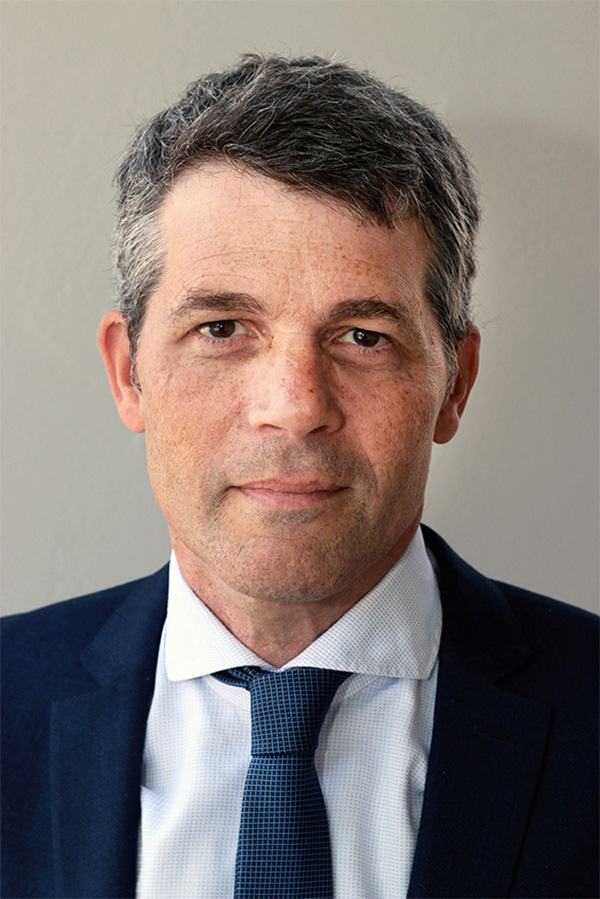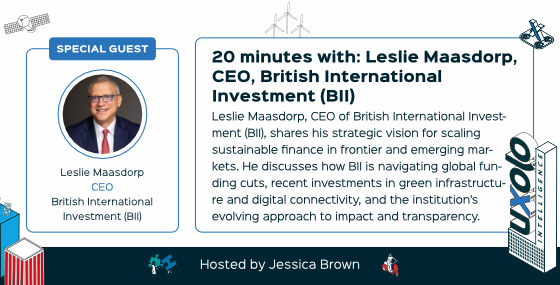COP26: From pledges to policies
Eric Usher, head of the UN Environment Programme Finance Initiative (UNEP FI), considers the significance of COP26 for the private sector, the phasing out fossil fuel, regulatory requirements, and some of the disappointments.

UNEP FI has been instrumental in bringing together the UN with a global group of banks, insurers and investors working to develop the sustainable finance and responsible investment agendas. As the final curtain nears at COP26 in Glasgow, Eric Usher – head of UNEP FI – ponders the outcomes of the high-profile annual climate conference.

From your perspective, how are the climate negotiations going so far and what are the key outcomes from COP26 in mobilising private capital towards climate finance?
Eric Usher: Overall, we're quite pleased with the developments. There have been improvements in countries' nationally determined contributions (NDCs) and particularly calling out India with their NDC. Some would say 2070 is too late, but just getting them onto a net zero trajectory is very important. Some of the sub aspects of their commitment like aiming to have half of their electricity from renewables by 2030 is very significant. So, on NDCs there definitely have been improvements.
Of course, the big step has been on net zero commitments. Now roughly 92 percent of global emissions are covered by net zero commitment, which is also a big step up. Of course, going from a pledge to actual near-term policies is the big next step and the next question.
Within the financial sector, I won't speak too much about climate finance within the 100 billion context, because we don't really work in that space very much. I don't have much comment to make in terms of the long-term finance and public commitments in that area. I will speak more about the private sector. Certainly, to complement governments ratcheting ambition, there has been a very large mobilization in recent months with Glasgow Financial Alliance for Net Zero (GFANZ).
We manage three of the big ones there for asset owners, for banks and insurers. Although the end point is 2050, for all these alliances, the important thing is what are the interim targets? And here they are very specific, I would say, more specific than what countries are doing in terms of requirements for setting interim targets. Here we have the very large number of $130 trillion bundled together. It's probably about the third of the global capital markets of the financial system more broadly, who are under a net zero framework now, like countries. Of course, it doesn't mean that much until it becomes near term. So the devil is in the detail.
But here I would say there has been good progress. We are working with the grandfather of these alliances, which is the Net-Zero Asset Owner Alliance, which is two years old, which in Net-Zero terms is quite old. So much is happening. But in this group, now it is 63 pension funds and insurers today together representing, managing about $10 trillion in assets. So, it's probably about 10 percent of the institutional investment community. But they are the most advanced within the financial sector in terms of setting near-term targets.
Two weeks ago, they issued their first progress report on collective progress. This past January, they released a 2025 target setting protocol. It's like the equivalent of the Paris rulebook for how do you set and communicate targets for 2025. The first interim target is just four years from now. The targets have to be based on the science, essentially Intergovernmental Panel on Climate Change (IPCC) or International Energy Agency (IEA) scenarios. There is no or low overshoot, so not expecting to have a miracle technology developed in the 2040s. It is really about getting started now.
So based on the science, essentially the reductions that are required are between 16 and 29%. What we have seen since the protocol was established and the individual members have issued their own targets, they all fall within that range. Most of them are roughly around well between 25 and 30% reductions in the coming four years, at the portfolio level and then very specifically at different asset class or sectoral levels. So they've been very detailed on what these interim targets mean, and essentially the steps are taken to follow through. So in general, we would say there's been a lot of ambition in terms of stepping up. I think going out of Glasgow, the real question obviously is follow through and that's both to governments and politicians and also to the private sector, including the financial sector, is essentially putting meat on the bones of the skeletal commitments to make them really credible.
Speaking of following commitments, big pledges were made last week here in Glasgow, but do you think there is a sizeable amount to do at a granular level for these sweeping policy statements, particularly when it comes to regulations or regulatory frameworks?
Short answer would be absolutely. António Guterres, Secretary-General of the UN, announced in his opening speech the intention to establish an expert group in the U.N. to look at these commitments from non-state actors and how to make them credible. There are various parties who are establishing criteria, particularly under the race to zero, which is a criteria on what the commitment should look like.
The alliances we work with under GFANZ, they have very strict requirements in terms of the need to issue interim targets by 2025 or 2030 at the latest. They need to be based on science, no low overshoot scenarios. There needs to be a large focus on driving reduction in the real economy. So, it's not so much about just decarbonising your own portfolio by dumping stocks that someone else is going to pick up and continue business as usual. But really, how do you drive change within the companies that you're lending to or that you're owning or insuring? So, the intention initially was about setting targets. There hasn't yet been enough work done on the follow-through part in terms of oversight on how these targets are actually being delivered. That's a gap.
One of the important announcements, certainly last Tuesday was on the Financial Stability Board announcing that they will expect that the GFANZ alliances will start reporting to the Financial Stability Board (FSB). That sends a very strong regulatory signal. We heard the U.K. government announce that companies in the U.K. will need to start disclosing Paris alignment or net zero strategies. The regulatory signaling has started. We know regulations don't even need to get in place for regulators to send very strong messages about the need to step up. So, we're already hearing the first sounds about that.
It is a challenge for financial regulators because their core mandate is financial stability. In traditional notions, financial stability is a fairly near-term concept. Although climate change is happening, the objective is not directly a financial objective. It's an environmental one. That's not something that financial regulators have traditionally been dealing with. Now we are starting to hear the messaging around it. It's a little bit of a backward approach, rather than regulators deciding that they have responsibility for environmental materiality and regulating for net zero. It's really in a voluntary way the private sector who is announcing that they are going to align. For us, we don't believe that there is a wait-and-see positioning in the private sector. We basically believe it makes sense for the private sector to lean in, get started, send signals voluntarily, and then regulators will try to ratchet. But in a way that makes sense, rather than coming up with a very painful regulatory approach. We call it a dance between public and private to essentially be signaling each other as the ambition moves forward. What we saw last week and continuing now is very much positively headed in that direction.
Among the key discussions I’m hearing at COP26 is about phasing out fossil fuels. Particularly by acquiring coal power plants to phase them out eventually. How can the private sector play a role in this? And where essentially is the money going to come from?
There are some approaches that are being posited out there. I don't have all the answers. I think the private sector certainly can play a partial role in that. Obviously, regulators or governments need to play a role. We think about the jobs that are going to be going away. One of the challenges within the financial sector is leadership. But the problem is there are still laggards within the financial system. So, for a leader to divest from coal assets just to be picked up by a laggard that doesn't benefit anyone. To some extent, the challenge is, unless it's not economic, to dig the stuff out of the ground, it's going to get dug out and we can't rely upon the financial sector to necessarily solve this basic economic challenge.
It's true that it could become too risky for public-facing financial actors from a reputation risk or otherwise perspective. But there are a lot of public sources of capital who aren't as exposed and may still be willing to pick up those assets. Or there are other parts of the financial markets in the private markets which are also not so publicly exposed. So there need to be some real economic approaches like the auctions that Germany ran last year. Auctioning off and shutting down coal capacity in Germany. That was a good example of what we would call a cash for clunkers type program, which is to pay to take these generative facilities offline.
We have to remember, for instance, in the U.S., many of the coal companies are in Chapter 11. They're bankrupt, but they're still generating all electricity and emissions, which means even when you're pushed into bankruptcy, the capital markets are no longer interested in you. But if you are cash flow positive, you continue to operate. So, the challenges of closing out coal, although the private sector can play a role, let's remember that we will need smart regulatory and public policy approaches to almost lead that transition. Very important within the climate agreement, within the COP text, as its positioned now that phasing out coal is in there, that will be a big boost to governments particularly and also signals to the private sector. Let's see if it survives the next 24 hours.
Lastly, what have been the disappointments with COP26 for you?
Obviously we could always hope for more, and I think one of the big disappointments is that post-COVID, it seems pretty clear that emissions are bouncing back to pre-COVID levels, so there's been no benefit in terms of shutting down our industries. We're just opening them up full throttle again.
The most recent stimulus that's been applied to restart the economy has not been very low carbon focused. So that's a big worry in terms of carbon lock in, essentially. But that doesn't really link to the COP26 itself other than potentially the national commitments that have been made coming in, which I would say have lacked ambition in that area.





